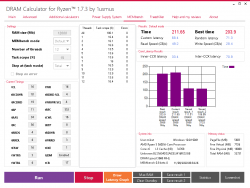Hey hoping I can piggy back off this thread.
I've been trying to lower my timings and I'm relatively new to all of this. Can anyone suggest what timings to go after next?



I have the dimm voltage set to 1.45v in BIOS.
Sticks I'm using are Gskill F4-3800C14D-16GTZN.
Thanks in advance, any help/advice is appreciated!
EDIT: I have done 3 successful passes of Memtest86+ with these timings / voltage.
I've been trying to lower my timings and I'm relatively new to all of this. Can anyone suggest what timings to go after next?
I have the dimm voltage set to 1.45v in BIOS.
Sticks I'm using are Gskill F4-3800C14D-16GTZN.
Thanks in advance, any help/advice is appreciated!
EDIT: I have done 3 successful passes of Memtest86+ with these timings / voltage.














